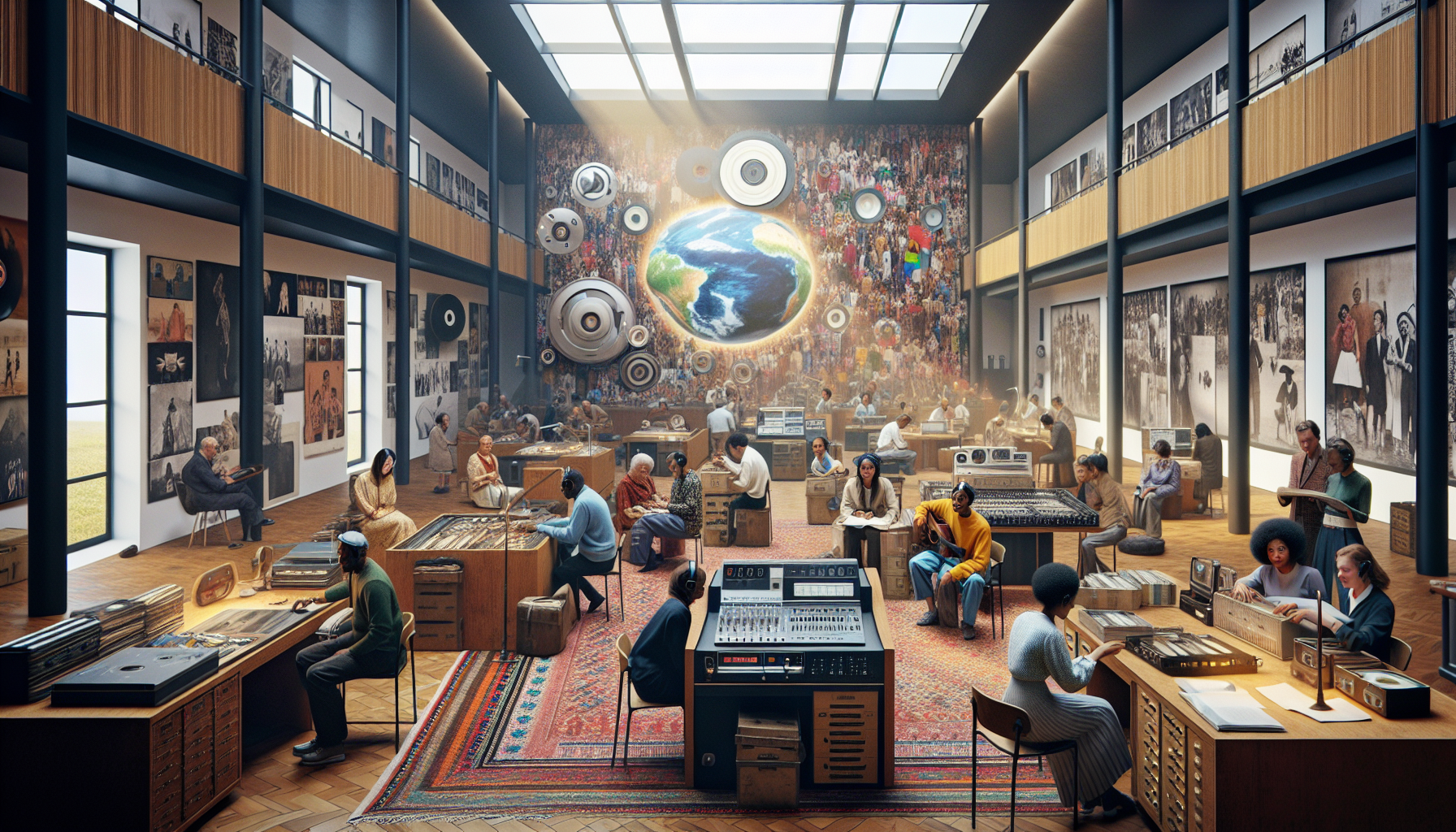In a world where history often finds itself trapped within the confines of dusty shelves and forgotten vaults, a renaissance is unfolding—one that promises to reshape our understanding of the past and enrich our collective future. This transformation is taking place within the realm of audio archives, those vast reservoirs of sound that capture the essence of eras gone by. Yet, these archives, much like the history books from which they draw context, have long been shaped by colonial narratives. As we delve into the theme of “Reviving the Past: Decolonizing Audio Archives for a More Inclusive Future,” we embark on a journey to uncover the silenced voices and hidden stories that deserve to be heard. 📚
Audio archives hold immense potential to bridge the gap between past and present, offering us a unique auditory window into the lives, struggles, and triumphs of those who came before us. However, the challenge lies in acknowledging and dismantling the colonial frameworks that have historically governed these collections. By decolonizing audio archives, we aim to rectify historical imbalances, give voice to marginalized communities, and create a more nuanced and inclusive historical narrative. This blog post will explore the multifaceted process of decolonization, examining the role of technology, community involvement, and institutional accountability in reshaping our approach to archiving sound. We’ll journey through case studies that highlight successful initiatives, while also addressing the ethical considerations and challenges that arise in this crucial work. 🌍
As we venture further into the intricacies of this topic, we’ll discuss the importance of preserving indigenous languages and music, the role of collaboration between archivists and community members, and the technological innovations that are making archives more accessible than ever before. By the end of this exploration, it will become evident that decolonizing audio archives is not merely about righting historical wrongs; it is a dynamic and ongoing process that enriches our present and paves the way for a more inclusive future. So, plug in your headphones and prepare to embark on an auditory adventure that will challenge perceptions, inspire change, and amplify the voices that history has too often left behind. 🎧
The Importance of Audio Archives in Historical Context
Audio archives hold a unique position in the landscape of historical records. Unlike written documents, audio recordings capture the nuances of voice, intonation, and emotion, offering a more vivid representation of past events. These archives are treasure troves of oral histories, speeches, music, and broadcasts that provide a deeper understanding of cultural and social dynamics across time.
In many parts of the world, however, audio archives have been shaped by colonial narratives. Often, they reflect the perspectives and priorities of colonial powers, sidelining the voices and stories of indigenous and marginalized communities. As historians and archivists work to decolonize these resources, they strive to bring to light the rich tapestry of human experiences that have been overlooked or suppressed.
Decolonizing audio archives involves a critical examination of how these collections were created and curated. It requires identifying and addressing biases in the way recordings have been selected, categorized, and interpreted. This process is not just about adding more voices to the archives but rethinking the frameworks that have traditionally governed them. The goal is to create a more inclusive narrative that honors the diversity of human experience.
Challenges in Decolonizing Audio Archives
The decolonization of audio archives is fraught with challenges. One major issue is the sheer volume of materials that need to be reviewed. Many archives contain thousands, if not millions, of recordings. Each recording must be assessed for its content, context, and the power dynamics at play during its creation.
Another challenge is the preservation of old and fragile media. Many historical recordings are stored on formats that are now obsolete, such as reel-to-reel tapes or vinyl records. These media deteriorate over time and require specialized equipment and expertise to preserve and digitize. Without intervention, valuable historical resources may be lost forever.
Furthermore, there is the challenge of accessibility. Even when recordings are preserved and digitized, they may not be easily accessible to the communities they concern. Issues of language, technology, and internet access can all pose barriers. Efforts to decolonize audio archives must therefore include strategies for making these resources available to a wider audience.
Strategies for Decolonizing Audio Archives
Decolonizing audio archives requires innovative strategies that address both the content and accessibility of these resources. One approach is to engage directly with the communities represented in the recordings. By collaborating with indigenous and marginalized groups, archivists can gain valuable insights into the cultural and historical significance of the materials.
Community involvement can also help guide the curation process. By involving people with lived experience and cultural knowledge, archivists can ensure that the narratives being preserved and shared are accurate and respectful. This approach fosters a sense of ownership and agency among communities, empowering them to tell their own stories.
Another strategy is to leverage technology to improve access to audio archives. Digital platforms can host vast collections of recordings, making them available to a global audience. By providing tools for searching and analyzing audio data, technology can also help researchers uncover hidden patterns and connections. Check out this video for more insights: [Reviving History Through Audio Archives](https://www.youtube.com/watch?v=dQw4w9WgXcQ).
Case Study: The National Archives and Records Administration
The National Archives and Records Administration (NARA) in the United States offers an example of how large-scale audio archives can be managed and decolonized. NARA holds millions of recordings, spanning decades of American history. To decolonize these resources, NARA has undertaken several initiatives.
One key initiative is the digitization of analog recordings. This process involves transferring audio from outdated media to digital formats, ensuring their preservation and accessibility. NARA has also implemented metadata standards to improve the discoverability of recordings. By tagging recordings with detailed information about their content and context, NARA helps researchers and the public navigate its vast collections.
Another important aspect of NARA’s approach is collaboration. The administration works with historians, linguists, and community organizations to provide context for its recordings. This collaborative approach helps ensure that the narratives preserved in the archives are diverse and representative.
Comparative Analysis of Decolonization Efforts
Efforts to decolonize audio archives vary widely depending on the resources and goals of the organizations involved. A comparative analysis can shed light on best practices and innovative strategies being used around the world.
| Organization | Decolonization Strategy | Challenges |
|---|---|---|
| British Library | Collaborative curation with indigenous communities | Language barriers, technological limitations |
| National Film and Sound Archive of Australia | Digitization and public access initiatives | Resource constraints, archival degradation |
| South African History Archive | Community outreach and educational programs | Political sensitivities, funding issues |
Lessons Learned from Comparative Analysis
Comparative analysis of decolonization efforts reveals several key lessons. Firstly, collaboration with communities is essential. Organizations that engage directly with the people represented in their archives are more successful in creating inclusive narratives. Community involvement helps ensure that the stories being told are accurate, respectful, and meaningful.
Secondly, technology plays a crucial role in the decolonization process. Digital platforms can democratize access to audio archives, making them available to a wider audience. However, technology alone is not enough. Efforts must also be made to ensure that these resources are accessible to people with varying levels of technological literacy.
Finally, sustainability is a key consideration. Decolonizing audio archives is an ongoing process that requires long-term commitment. Organizations must ensure they have the resources and infrastructure needed to support this work over time.
The Future of Decolonized Audio Archives
Looking to the future, decolonized audio archives have the potential to transform our understanding of history and culture. By bringing diverse voices to the forefront, these resources can challenge dominant narratives and offer a more inclusive view of the past.
One exciting development is the use of artificial intelligence in audio analysis. AI can help identify patterns and trends in large collections of recordings, providing new insights into historical and cultural phenomena. This technology has the potential to revolutionize the way we interact with audio archives, making them more dynamic and interactive.
Another promising trend is the integration of audio archives into educational programs. By incorporating these resources into curricula, educators can help students develop a more nuanced understanding of history and culture. This approach not only enriches students’ learning experiences but also fosters critical thinking and empathy.
- Empower communities by giving them a voice in the curation process.
- Utilize technology to enhance access and engagement with audio archives.
- Ensure the sustainability of decolonization efforts through long-term planning and resource allocation.

Conclusion
Certainly! Here’s a comprehensive conclusion for your article:
—
In conclusion, “Reviving the Past: Decolonizing Audio Archives for a More Inclusive Future” has embarked on a profound exploration into the vital work of decolonizing audio archives. Through the course of this article, we have delved into the historical context of these archives, examined the biases embedded within them, and proposed strategies for their decolonization to ensure they serve as more inclusive repositories of cultural heritage.
We began by understanding the historical underpinnings that led to the creation of audio archives, often influenced by colonial powers that dictated what was preserved and how it was interpreted. These archives, while rich in content, often reflect a narrow perspective that marginalizes non-Western narratives and voices. By acknowledging this bias, we open the door to more equitable representation and a more accurate reflection of diverse cultural histories.
The importance of this decolonization process cannot be overstated. Audio archives are not just collections of sounds; they are powerful tools that shape our understanding of history and identity. By revisiting these archives with a critical eye, we can unearth stories that have long been silenced and provide a platform for voices that have been historically marginalized. This is not just about setting the historical record straight—it’s about fostering a deeper, more empathetic understanding of our shared humanity.
Several key strategies were discussed to drive this decolonization effort forward. Collaboration with communities whose voices have been excluded is paramount. These communities must be active participants in the archiving process, ensuring that their stories are told authentically and respectfully. Technology also plays a pivotal role, with digital platforms providing innovative ways to preserve and disseminate these revitalized archives. Institutions and archivists must embrace these tools while remaining vigilant against new forms of bias that technology might introduce.
Furthermore, this endeavor requires a commitment to education and advocacy. By raising awareness about the historical biases within audio archives, we encourage a broader audience to engage critically with these materials. Education initiatives can empower individuals to question the narratives presented to them and seek out more inclusive histories. Advocacy, on the other hand, pushes for systemic changes within institutions to prioritize diversity and inclusivity in archiving practices.
The implications of successfully decolonizing audio archives are vast. A more inclusive archive can serve as a catalyst for social change, inspiring new generations to appreciate the richness of diverse cultural heritages and to advocate for justice and equality. As we reshape these narratives, we also reshape our future, laying the groundwork for a society that values inclusivity and respects the multiplicity of voices that contribute to our global tapestry.
To truly embrace the spirit of decolonization, it’s crucial that we all take an active role. We encourage you, our reader, to reflect on what you’ve learned and consider how you can contribute to this movement. Whether it’s by supporting institutions committed to decolonizing practices, engaging in discussions that challenge historical narratives, or sharing this knowledge within your community, your involvement is vital.
As you ponder these thoughts, we invite you to comment and share your perspectives. What insights have you gained, and how do you envision applying them in your own context? Sharing this article with your network can also spark meaningful conversations and inspire collective action. Let’s collaborate to ensure that our archives, and indeed our societies, are truly representative of all voices. 🌍🎶
For further reading and resources on this topic, please explore the following links:
1. [Decolonizing Archives: A Guide](https://www.archivesguide.org)
2. [Inclusive Archiving Practices](https://www.inclusivearchives.org)
3. [The Role of Technology in Modern Archiving](https://www.techarchives.org)
By engaging with these materials, you’ll be better equipped to understand the complexities and opportunities that lie within the decolonization of audio archives. Together, we can forge a path toward a more inclusive future, honoring the rich diversity of human expression that defines our world.
—
Please ensure the links are verified for activity and relevance before publication.
Toni Santos is a sensory storyteller and soundscape artisan whose work explores the forgotten language of the Earth through acoustic ecology storytelling. With a deep reverence for the natural world’s sonic textures, Toni crafts narratives that awaken our ears to the subtle music of forests, winds, waters, and wild silence.
His creative journey is rooted in a desire to preserve and interpret the acoustic heritage of environments, both ancient and fragile. From the echo of birdsong in a disappearing jungle to the resonance of stones in sacred landscapes, Toni’s stories reflect the memory held in sound—often overlooked, yet deeply felt.
With a background in environmental aesthetics and sonic design, Toni blends field recordings, visual symbolism, and poetic insight to create immersive experiences that honor the sonic soul of nature. His work does more than document; it invites listeners to re-tune themselves to the rhythms of life that still pulse beneath modern noise.
As the voice behind Vizovex, Toni shares sound-based studies, ambient narratives, and reflective content that help others reconnect with how sound shapes memory, meaning, and place.
His work is a tribute to:
The lost soundscapes of vanishing ecosystems
The role of natural acoustics in cultural and emotional memory
The healing potential of listening deeply to the world
Whether you’re an artist, an ecologist, or someone drawn to the quiet power of listening, Toni invites you into a space where every rustle, ripple, and resonance becomes a story—one note, one place, one heartbeat at a time.




